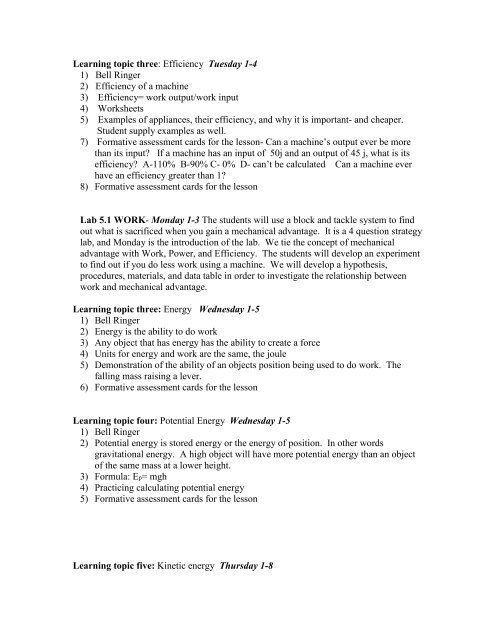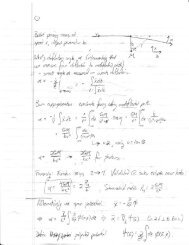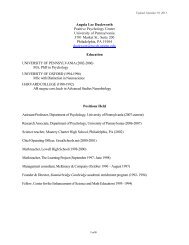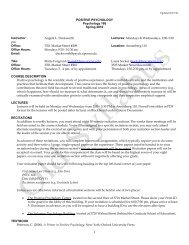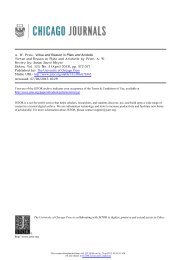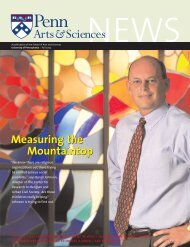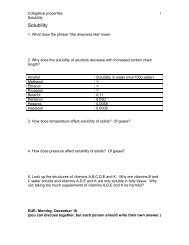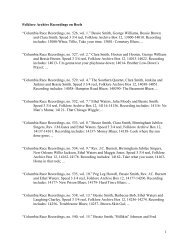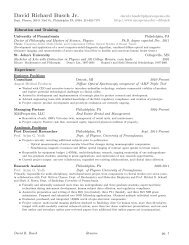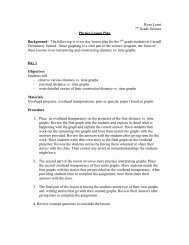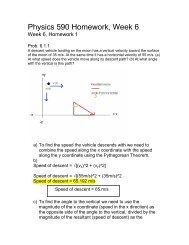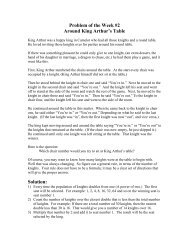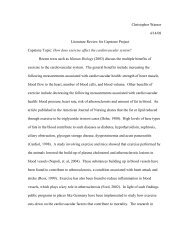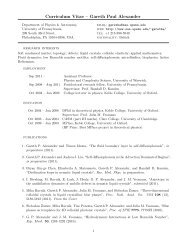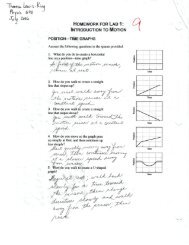Chapter 5: Work, Energy and Power Teacher: Kenneth O'Rourke ...
Chapter 5: Work, Energy and Power Teacher: Kenneth O'Rourke ...
Chapter 5: Work, Energy and Power Teacher: Kenneth O'Rourke ...
Create successful ePaper yourself
Turn your PDF publications into a flip-book with our unique Google optimized e-Paper software.
Learning topic three: Efficiency Tuesday 1-4<br />
1) Bell Ringer<br />
2) Efficiency of a machine<br />
3) Efficiency= work output/work input<br />
4) <strong>Work</strong>sheets<br />
5) Examples of appliances, their efficiency, <strong>and</strong> why it is important- <strong>and</strong> cheaper.<br />
Student supply examples as well.<br />
7) Formative assessment cards for the lesson- Can a machine’s output ever be more<br />
than its input? If a machine has an input of 50j <strong>and</strong> an output of 45 j, what is its<br />
efficiency? A-110% B-90% C- 0% D- can’t be calculated Can a machine ever<br />
have an efficiency greater than 1?<br />
8) Formative assessment cards for the lesson<br />
Lab 5.1 WORK- Monday 1-3 The students will use a block <strong>and</strong> tackle system to find<br />
out what is sacrificed when you gain a mechanical advantage. It is a 4 question strategy<br />
lab, <strong>and</strong> Monday is the introduction of the lab. We tie the concept of mechanical<br />
advantage with <strong>Work</strong>, <strong>Power</strong>, <strong>and</strong> Efficiency. The students will develop an experiment<br />
to find out if you do less work using a machine. We will develop a hypothesis,<br />
procedures, materials, <strong>and</strong> data table in order to investigate the relationship between<br />
work <strong>and</strong> mechanical advantage.<br />
Learning topic three: <strong>Energy</strong> Wednesday 1-5<br />
1) Bell Ringer<br />
2) <strong>Energy</strong> is the ability to do work<br />
3) Any object that has energy has the ability to create a force<br />
4) Units for energy <strong>and</strong> work are the same, the joule<br />
5) Demonstration of the ability of an objects position being used to do work. The<br />
falling mass raising a lever.<br />
6) Formative assessment cards for the lesson<br />
Learning topic four: Potential <strong>Energy</strong> Wednesday 1-5<br />
1) Bell Ringer<br />
2) Potential energy is stored energy or the energy of position. In other words<br />
gravitational energy. A high object will have more potential energy than an object<br />
of the same mass at a lower height.<br />
3) Formula: Ep= mgh<br />
4) Practicing calculating potential energy<br />
5) Formative assessment cards for the lesson<br />
Learning topic five: Kinetic energy Thursday 1-8


